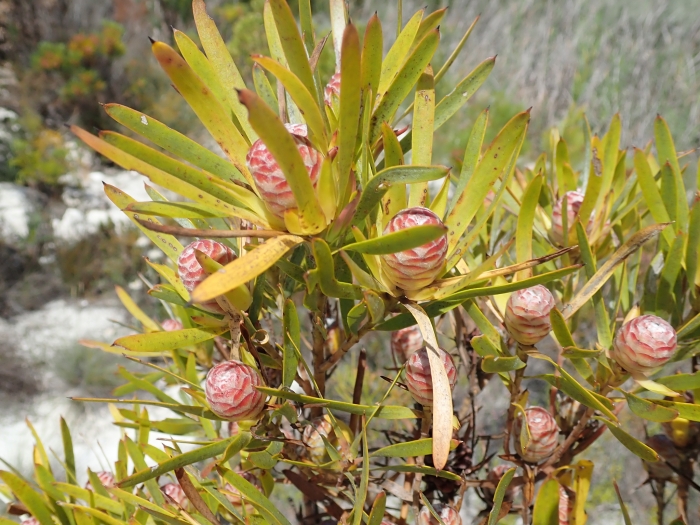Sickle-Leaf Conebush
(Leucadendron xanthoconus)
Sickle-Leaf Conebush (Leucadendron xanthoconus)
/
/

Peter Warren
Public Domain
Image By:
Peter Warren
Recorded By:
Copyright:
Public Domain
Copyright Notice:
Photo by: Peter Warren | License Type: Public Domain | License URL: http://creativecommons.org/publicdomain/zero/1.0/ | Rights Holder: Peter Warren | Publisher: iNaturalist | Date Created: 2020-02-03T13:55:15-08:00 |



















































Estimated Native Range
Summary
Leucadendron xanthoconus, commonly known as Sickle-Leaf Conebush, is an evergreen shrub native to the mountain fynbos of the south-western Cape in South Africa. This species is adapted to a Mediterranean climate, thriving in regions with wet winters and dry summers. It typically grows 1–2 meters tall and is characterized by its sickle-shaped leaves and woody cones that accumulate seeds for 2-3 years. These cones are serotinous, meaning they release seeds en masse following fire events, which are a natural part of the fynbos ecology. The plant itself is killed by the fire, but its seeds are adapted to germinate in the nutrient-rich ash that follows. Leucadendron xanthoconus has a fast growth rate under optimal conditions, with adequate water and nutrients during the first six months.
The Sickle-Leaf Conebush is valued for its striking yellow flowers that bloom in the spring, contributing to its ornamental appeal. It is often used in xeriscaping due to its low water requirements once established and is suitable for creating dramatic effects in rock gardens or as part of a mixed shrub border. While it prefers full sun, it can tolerate light shade. It is important to provide well-drained soil, as the plant is susceptible to root rot in poorly drained conditions. There are no major diseases affecting this species, but it can suffer from drought stress, which may reduce the biomass of leaves and roots. Gardeners should be aware that this plant does not form a persistent seed bank, so it relies on periodic fires for regeneration in its native habitat.CC BY-SA 4.0
The Sickle-Leaf Conebush is valued for its striking yellow flowers that bloom in the spring, contributing to its ornamental appeal. It is often used in xeriscaping due to its low water requirements once established and is suitable for creating dramatic effects in rock gardens or as part of a mixed shrub border. While it prefers full sun, it can tolerate light shade. It is important to provide well-drained soil, as the plant is susceptible to root rot in poorly drained conditions. There are no major diseases affecting this species, but it can suffer from drought stress, which may reduce the biomass of leaves and roots. Gardeners should be aware that this plant does not form a persistent seed bank, so it relies on periodic fires for regeneration in its native habitat.CC BY-SA 4.0
Plant Description
- Plant Type: Shrub
- Height: 3-6 feet
- Width: 3-5 feet
- Growth Rate: Rapid
- Flower Color: Yellow
- Flowering Season: Spring
- Leaf Retention: Evergreen
Growth Requirements
- Sun: Full Sun
- Water: Low
- Drainage: Medium, Fast
Common Uses
Bee Garden, Drought Tolerant, Low Maintenance, Showy Flowers
Natural Habitat
Native to the mountain fynbos of the south-western Cape in South Africa, adapted to a Mediterranean climate with wet winters and dry summers
Other Names
Common Names:
Scientific Names: , Leucadendron xanthoconus, Protea xanthoconus,
GBIF Accepted Name: Leucadendron xanthoconus (Kuntze) K.Schum.